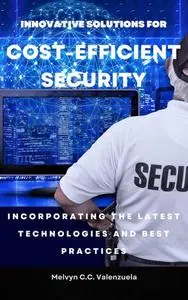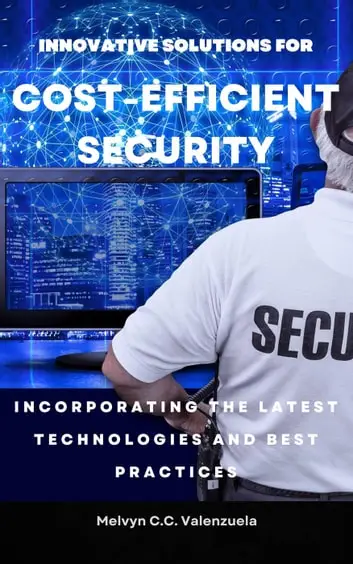Innovative Solutions for Cost-Efficient Security: Incorporating the Latest Technologies and Best Practices by Melvyn C.C. Valenzuela
English | April 10, 2023 | ISBN-10: 6218303527 | ISBN-13: 9786218303522 | 50 Pages | EPUB | 0.8 MB
English | April 10, 2023 | ISBN-10: 6218303527 | ISBN-13: 9786218303522 | 50 Pages | EPUB | 0.8 MB
In today's complex and rapidly evolving security landscape, it's more important than ever for security departments to operate as efficiently and effectively as possible. This book provides a comprehensive and practical guide to budgeting, resource allocation, and cost-saving measures in the field of security operations.
With step-by-step instructions and real-life examples, this book covers everything you need to know to optimize your security department and improve your overall level of protection.
Topics include:
Identification of inefficiencies and areas for improvement
Budgeting and resource allocation
Prioritizing expenses based on risk and need
Utilizing technology for improved security operations
Implementing outsourcing and partnerships for cost savings
Reducing operational costs through improved processes and procedures
Building and maintaining an effective team
Hiring and training security personnel
Performance management and improvement
Maintaining a high level of security through continuous assessment
Updating security procedures and protocols as needed
Incorporating new technologies and best practices to improve security
This book is essential reading for security directors, managers, and professionals looking to enhance their security operations while reducing costs and maximizing coverage. Whether you're starting from scratch or looking to improve an existing operation, you'll find practical, actionable advice in this comprehensive guide.
Get your copy of "Innovative Solutions for Cost-Efficient Security: Incorporating the Latest Technologies and Best Practices" today and start optimizing your security operations!
I. Introduction
A. Importance of organizing a cost-effective security department
II. Assessment of Current Security Operations
A. Evaluation of current security personnel and equipment
Skills Assessment
Experience Assessment
Training Gap Analysis
Sample Format for Evaluating Security Personnel
B. Analysis of current security procedures and protocols
Procedures And Protocols
Sample Security Procedures and Protocols
Sample Format For Security Procedures
Sample Format For Security Protocol
C. Identification of inefficiencies and areas for improvement
Sample Format For Identifying Inefficiencies And Areas For Improvement In Security Operations
III. Budgeting and Resource Allocation
A. Establishing a budget for security operations
Historical Cost Analysis
Benchmarking
Forecasting
Budgeting and Resource Allocation
B. Prioritizing expenses based on risk and need
Risk Assessment
Risk Assessment Process
C. Allocating resources effectively to maximize coverage and minimize costs
IV. Implementing Cost-Saving Measures
A. Utilizing technology for improved security operations
B. Implementing outsourcing and partnerships for cost savings
C. Reducing operational costs through improved processes and procedures
V. Building and Maintaining an Effective Team
A. Hiring and training security personnel
Example of Job Requirements:
Recruitment Plan
Background Checks
Sample Interview Questions To Assess Skills And Experience
Sample Format For Evaluating A Candidate's Training
B. Establishing clear roles and responsibilities
Job Description
Example Of A Job Description For A Security Officer
Example Performance Expectations For A Security Officer
Rating Performance Expectations
Key Performance Indicator
Performance Expectations and Key Performance Indicators (KPIs)
Measuring Key Performance Indicators (KPIs)
C. Building and maintaining a positive organizational culture
VI. Maintaining a High Level of Security
A. Continuous assessment of security operations
Assessment Process
B. Updating security procedures and protocols as needed
C. Incorporating new technologies and best practices to improve security
Examples Of New Technologies And Best Practices
VII. Conclusion
A. Summary of key takeaways
B. Final thoughts and recommendations
C. Future outlook for cost-effective security departments
A. Importance of organizing a cost-effective security department
II. Assessment of Current Security Operations
A. Evaluation of current security personnel and equipment
Skills Assessment
Experience Assessment
Training Gap Analysis
Sample Format for Evaluating Security Personnel
B. Analysis of current security procedures and protocols
Procedures And Protocols
Sample Security Procedures and Protocols
Sample Format For Security Procedures
Sample Format For Security Protocol
C. Identification of inefficiencies and areas for improvement
Sample Format For Identifying Inefficiencies And Areas For Improvement In Security Operations
III. Budgeting and Resource Allocation
A. Establishing a budget for security operations
Historical Cost Analysis
Benchmarking
Forecasting
Budgeting and Resource Allocation
B. Prioritizing expenses based on risk and need
Risk Assessment
Risk Assessment Process
C. Allocating resources effectively to maximize coverage and minimize costs
IV. Implementing Cost-Saving Measures
A. Utilizing technology for improved security operations
B. Implementing outsourcing and partnerships for cost savings
C. Reducing operational costs through improved processes and procedures
V. Building and Maintaining an Effective Team
A. Hiring and training security personnel
Example of Job Requirements:
Recruitment Plan
Background Checks
Sample Interview Questions To Assess Skills And Experience
Sample Format For Evaluating A Candidate's Training
B. Establishing clear roles and responsibilities
Job Description
Example Of A Job Description For A Security Officer
Example Performance Expectations For A Security Officer
Rating Performance Expectations
Key Performance Indicator
Performance Expectations and Key Performance Indicators (KPIs)
Measuring Key Performance Indicators (KPIs)
C. Building and maintaining a positive organizational culture
VI. Maintaining a High Level of Security
A. Continuous assessment of security operations
Assessment Process
B. Updating security procedures and protocols as needed
C. Incorporating new technologies and best practices to improve security
Examples Of New Technologies And Best Practices
VII. Conclusion
A. Summary of key takeaways
B. Final thoughts and recommendations
C. Future outlook for cost-effective security departments
Hours to read: 0 - 1
Total words: 15k



